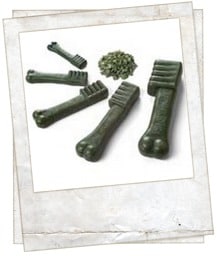 Some dogs will go their whole life and have a sparkling set of gnashers. They won’t have a build up of plaque, tartar or suffer with periodontitis. Other dogs, especially ones fed on a soft food diet may suffer with teeth problems for their whole life and require veterinary treatment to remove plaque, the teeth themselves or treat gum disease. The use of dog dental chews can help alleviate these problems.
Some dogs will go their whole life and have a sparkling set of gnashers. They won’t have a build up of plaque, tartar or suffer with periodontitis. Other dogs, especially ones fed on a soft food diet may suffer with teeth problems for their whole life and require veterinary treatment to remove plaque, the teeth themselves or treat gum disease. The use of dog dental chews can help alleviate these problems.
The importance of keeping oral hygiene in dogs well maintained is highly necessary for their overall health and well-being, just as much as general dog grooming and coat maintenance are. Untreated gum disease can filter bacteria into the blood stream affecting organs and causing a whole host of otherwise avoidable problems. Good dog dental chews help prevent gum disease.
Unfortunately pet insurance providers are wise to this importance and most do not cover dental fees in their policy. This can be a problem for some owners who take their dog into the vets only to find that they have to foot the bill that can easily run into the hundreds.
This only adds to the importance of keeping your dog’s teeth in tiptop condition from the word go. As mentioned before, some dogs will never have a problem and although it can be considered hereditary it also comes down to what the owners are feeding their pets – sometimes without even realizing the significance of their food choices.
Although dog dental chews are popular amongst pet owners it is essential to choose the right sort if you want to get the best results.
Chewing helps to reduce plaque because whilst the dog is chewing it is creating more saliva, which contains high antibacterial properties and combined with the constant chewing motion the dog is effectively cleaning its teeth.
It is recommended that a dog be given something to chew on for around thirty minutes a day. This can include special dog dental chews, rawhide chews or toys. However, if using a food then you must remember that they all contain calories. A rawhide chew is widely acknowledged as being good for your dog’s teeth but if they are an aggressive chewer then they can end up with sharp splinters in their throat and stomach. As the owner you should know whether or not they are safe to give you dog.
Dog dental chews must be given in accordance with the dog’s size as the chewing only helps the teeth after a period of time. If it’s gone in two gulps your dog has only consumed calories he didn’t need and gained no benefits.
In addition to the dog dental chews, something that has much better long-term results, is actually cleaning a dog’s teeth. This can be added into your every day grooming routine, or be done in isolation if your pet does not have one.
If you are uncertain about doing this yourself you can always take your dog to a vet or pet spa both of which should be happy to assist you. A pet salon will also be able to answer any other dog-related questions such as how to groom a dog, what the best shampoos are and more.
Keeping a soft human toothbrush and special meat flavored toothbrush in with your dog grooming equipment will encourage you to brush the dog’s teeth daily and although the dog will probably think you have gone quite mad, as long as you build up good associations with the equipment you shouldn’t have a problem getting him used to it.
When you groom a dog it is easy to forget to clean their ears, clean their teeth and check their paws. However, once you get used to doing it, it will soon become second nature and your dog’s health will blossom due to your attentive care.
Cleaning a dog’s teeth is vital to maintain a happy, healthy dog. Feeding your dog a dry food will also help to keep them healthy, as will giving flavored dog dental chews and hard toys.
Putting their dinner into a Kong will cause them to work overtime to reach it and the rubber they will be chewing on will definitely add to their everyday teeth cleaning routine.
For more information about Dog Food Dangers and Dog Health, check out the highly recommended The Complete Guide To Your Dog’s Nutrition today!

